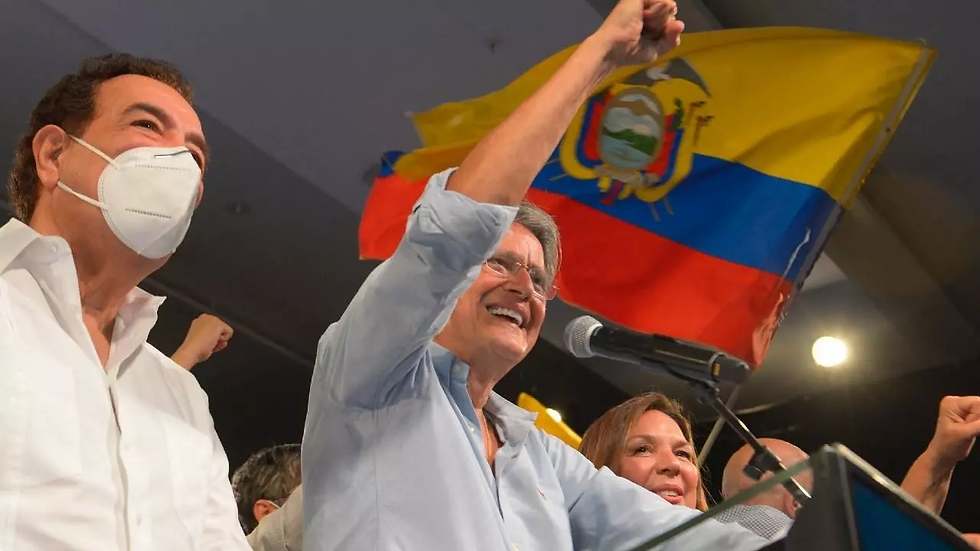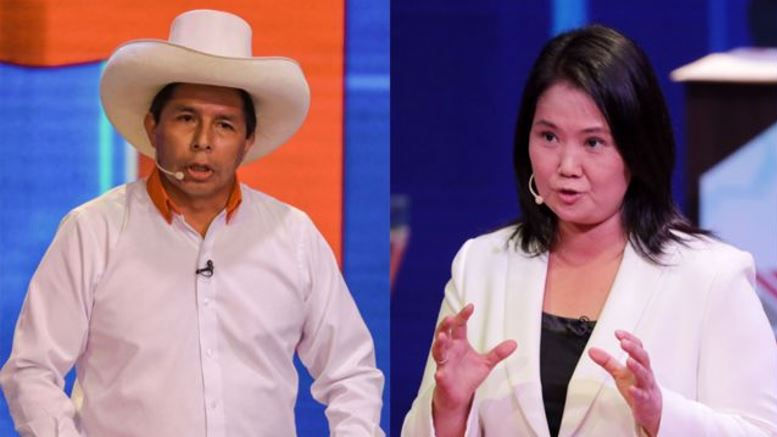The victory of Guillermo Lasso – Can the right wing beat Correismo?
- Carlos Mosquera

- May 23, 2021
- 4 min read

After having the same political party in power for decades, the latest Ecuadorian elections showed how the people changed their ideology and turned to the right wing – voting for former conservative banker Guillermo Lasso, a man who defends the free market and proposes liberal measures to end the crisis caused by "Correismo”. The Guayaquil native had previously tried to obtain the presidency three times, being victorious in his latest attempt after winning in the second round of elections against Andrés Arauz, a Correista candidate, who wanted to reestablish the social spending policies that characterized the two governments of Correa (2007-2017).
The figure of Rafael Correa as Arauz's mentor gave him a significant advantage in his campaign, despite Correa being politically disqualified due to his conviction for corruption. The defeat of Arauz is the first for the Correismo movement in its 14 years of power (Rafael Correo held office for 10 years while his appointed successor, Lenin Moreno, ruled for 4). By winning the elections between pro-Correa and "anticorreistas" (those against Correa), Lasso has effectively defeated the last remnants of 21st century socialism in Ecuador. Nevertheless, why is this victory so essential, and what does it represent for the country?
Correismo had successfully won previous elections and the leaders of the movement dedicated themselves to win over its people, however they were unable to achieve greater institutionalization as a movement beyond its leader. The movement's first transition was with the appointment of current president Lenin Moreno, a man who has failed in every aspect. Corruption has spread throughout the country, violence has increased, and his government's management in battling the pandemic has been disastrous. When Moreno came to power, he dissociated himself from Correa. Thanks to this, many embezzlement cases were uncovered in the old government that has caused damage to Correismo, a damage still seen today.

Another error that caused Andrés Arauz to lose was the inability to rally the left. There were three candidates with leftist tendencies in the first round, including Arauz. In the second round, neither of the two remaining leaders called to vote for Correa's movement, and one of them even showed his support for Lasso. According to Xavier Hervas, one of the left-wing parties' leaders, the Correista model has restricted freedoms in the country, mishandled public funds, and divided Ecuador with a speech of fracture and hatred for 14 years. With that lack of control in the Ecuadorian Left, Guillermo Lasso demarcated himself from the political fight and convinced the undecided voters, and the voters of the other parties, to vote for him.
Regardless, what about the Ecuadorian people? Ecuador is currently immersed in three crises: an economic one with an increase in unemployment and almost six million more poor people, a health crisis (one of the worst in Latin America), and a governance crisis with a government (that of Lenin Moreno) that does not reach 10% of credibility. The Ecuadorian population has not voted from an ideological point of view. It is not based on what type of system they want; the common Ecuadorian wants a government that will solve the health and economic problems at stake. There is an immense level of pessimism among the population.
Guillermo Lasso won the Presidency with the lowest percentage of votes in relation to the number of voters in 42 years. So low is the support, according to data from the National Electoral Council, that he was elected president with fewer votes than he obtained in 2017, when he lost.
Lasso obtained in the second round the support of 43% of the voters, the lowest figure since 1979, when democracy returned after the dictatorships of the 70s. Lasso received in 2021 the smallest vote of the three elections in which he has been. He reached 1,830,172 votes in the first round and 4,656,426 in the second round, and yes, both are lower figures than his previous participations. So, why are Lasso's voting numbers so low? The main reason is due to the invalid votes (16.26%), the highest percentage in 42 years.
That is why the future president has a vital duty if he wants to end the continuity of 14 years. The program that Guillermo Lasso presented has a neoliberal character. He intends a large tax cut and the readjustment of public spending to achieve what he calls a "minimal, but robust and efficient State." Despite this, he has criticized some measures imposed by Moreno after the agreement with the IMF. However, it remains to be seen what his performance will be once in government due to the painful austerity measures that have been imposed as part of an agreement for $ 6.5 billion from the IMF.
The advantage that the future president has is that thanks to his victory in the elections, the country risk of Ecuador has dropped about 400 points, making it attractive to foreign investment. It will be up to Lasso to use that to his advantage and bring more investment, making it possible to increase jobs in Ecuador and achieve good relations with countries or critical blocks for the Ecuadorian state in the market environment – such as the European Union or the United States. Furthermore, the future president has spoken about the international relations that Ecuador will have in the future. The objective is clear, to move away from socialist countries such as Venezuela or Bolivia and to approach countries such as Colombia and Peru, its neighbors, in hopes to join the Pacific Alliance as quickly as possible, which Lenin Moreno has already begun negotiations.
Also, the current vaccination plan is stagnant. The country is experiencing one of the worst moments of the pandemic, which recalls the images of a year ago, where the hospital and funeral systems collapsed. The future president promised in a campaign to accelerate that vaccination plan in the first 100 days of his mandate.
Politically, Lasso will face these challenges with a minority in Parliament, where Correismo has achieved a majority, although not enough to cause him major problems. However, the figures of the last elections have set a record (16% of invalid votes) showing the people's dissatisfaction to all of the presidential candidates. The future president will have to analyze and form political strategies that help him achieve his reforms and his future measures to be adopted.

Comments